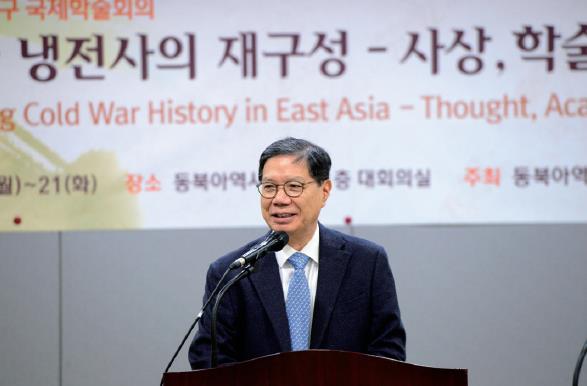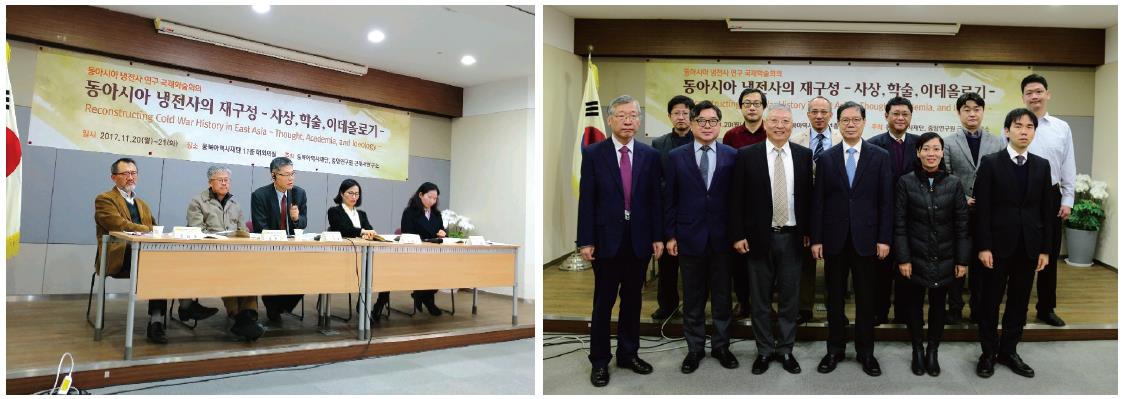NORTHEAST ASIAN HISTORY FOUNDATION 01/2018
-
Oh Byung-soo (Research fellow, NAHF Research Institute of Korea-China Relations)
On the 20th and 21st of November 2017, the Northeast Asian History Foundation jointly held an international academic conference with Academia Sinica's Institute of Modern History under the theme "Reframing East Asian History during the Cold War: Thoughts, Research, and Ideologies." The conference hosted a total of four sessions participated by 20 or so Korean, Taiwanese, Japanese, and Vietnamese scholars who eagerly discussed various topics, research methodologies, and experiences of the Cold War in their respective countries.
East Asian History during the Cold War and Regional Studies
In the conference's first session, Research fellow Huang Tzu-chin (黃自進) of Taiwan's Academia Sinica gave a presentation on "The Return of Okinawa and the Japan-Korea-Taiwan Interconnection," which covered the United States' post-war occupation of Okinawa and its return to Japan in the context of the Cold War. Huang particularly looked at how Japan managed to successfully regain Okinawa, which had been placed under the trusteeship of the United States as a strategic measure to ensure post-war security in East Asia. Huang mentioned how Japan actively sided with the United States' security policies such as that of containment on the one hand, and on the hand, played a leading role in developing its diplomatic relations with Korea and Taiwan in order to regain Okinawa. Through his presentation on "The Origin and Changes in China's Modern Internationalism," Professor Morikawa Hiroki (森川裕貫) of Kyoto University reviewed the internationalism of Zhou Geng-sheng (周鯁生), a renowned international law expert of modern China. Despite maintaining his belief in pre-war internationalism even after the war, Zhou Geng-sheng eventually had to give it as the Cold War intensified and due to other circumstantial difficulties under socialist China, and thereby shift toward "socialist internationalism." Research fellow Luong Thi Hong of the Vietnam Academy of Social Sciences presented on "Heated Struggles during the Cold War: Socialist Aid for Northern Vietnam, 1954-75." The presentation offered an empirical review of Soviet and Chinese aid to northern Vietnam during the Vietnam War, which had been prompted by multiple factors that involved conflicts between the United States and the Soviet Union, disputes between China and the Soviet Union, and Vietnam's respective conflicts with China and the Soviet Union.
The second session began with a presentation on "The Origin of Regional Studies on 19th Century Coastal Areas of East Asia During the Cold War" by Research fellow Marlon Zu (朱瑪瓏) of Academia Sinica. Zu focused on the makeup of information, knowledge, and scholarly research (regional studies) among Cold War powers. By tracing its origin back to the way 19th century English language magazines published in Hong Kong and Shanghai arranged and disseminated knowledge and information, Zu suggested a new method of using media publications to study Cold War history. Through his presentation on "The North Korean Understanding of the Non-aligned Movement in the 1950s," Professor Hong Jong-wook of Seoul National University shared an analysis on articles from the magazine "Gukje saenghwal" (International Living) published in North Korea during the 1950s. Hong highlighted the struggle North Korea must have gone through between anti-colonialism and international socialism. Professor Kim In-soo of Konkuk University gave a presentation titled "The Cold War and Intellectual Politics: The Circumstances Surrounding Park Jin-hwan's Analysis of Korean Farming Businesses," which offered a reinterpretation of the formation of social science studies in Korea in the context of the Cold War. From studying sources kept by the Rockefeller Foundation, Kim traced the close connection the analysis Park Jin-hwan performed on Korean farming businesses (1966) had with the Cold War policies of the United States in order to demonstrate the impact American academic authority, armed with scholarly networks, research funds, and training opportunities, had on the formation of social science studies in Korea.
Liberalism and Historical Studies on the Cold War
In the third session, Professor Yun Hae-dong of Hanyang University presented on "Cold War Liberalism and the Post-Liberal Shift in Korean Politics." The colonialist nature of non-Western societies that functioned by melding liberalism with other ideologies such as nationalism or anti-communism, not to mention the change in the Cold War's nature during the 1950s and 1960s were the conditions Yun highlighted in his presentation to gain an understanding of Rhee Syngman and Park Chung-hee's liberalism in relation to the Cold War liberalism of the United States or the ordoliberalism of West Germany. Research fellow Hwang Byeong-ju of the National Institute of Korean History next offered a presentation on "Enemy Property Disposal and Liberalism in the Early Stages of the Cold War." Through his presentation, Hwang analyzed the disposal of enemy property in Korea to determine the impact the United States had over the formation of Korea's system as a state. According to its Cold War policies, the United States renounced its claims for war reparations against Japan, confiscated publicaly or privately owned Japanese property in Korea, and disposed of them to the Korean government or individuals in Korea. Hwang argued that such a process of disposal resulted in today's national system of Korea that resembles the American combination of liberalism and capitalism, yet embodies a concomitance of private ownership and public or state ownership. Professor Jang In-sung of Seoul National University focused on the thoughts of Japanese political scientist Maruyama Masao (丸山眞男) through his presentation "The Cold War and Japanese Liberalism: Maruyama Masao's 'Cold War Liberalism' and 'Realism'." Jang closely traced the thoughts and experiences of Maruyama Masao, who initially believed that freedom depends on the capability to rationally self-determine, but later came to suggest "neutrality," "peace," "impartial decision-making," and "autonomous association" as alternatives against the reality of the Cold War that threatened freedom and democracy.
At the final session, Professor Chen Xueran (陳學然) of the City University of Hong Kong gave a presentation on "De-politicized Political Manipulation: Hong Kong Education Policies and Objectives During the Cold War." From the angle of de-politicization, Chen reviewed how different political forces involved themselves in post-war middle and high school education and how such attempts were regulated by the authorities in Hong Kong. Through his presentation "In Search of the Reserve of Anticommunist Thoughts: Focusing on Hu Shih's (胡適) Reflections and Appraisal of the Late Chen Duxiu," Research fellow Pan Kuang-che (潘光哲) of Academia Sinica's Institute of Modern History examined the thoughts the Chinese philosopher Chen Duxiu (陳獨秀) had on democracy and how his thoughts on party politics changed. Finally, NAHF Research fellow Oh Byung-soo offered a presentation on "Research Trends and Outlook on East Asian History During the Cold War" to point out that various recent studies have been raising the need to understand Cold War history in the context of regional history. Oh also suggested the possibility of examining East Asian history during the Cold War as a series of processes to aimed at obtaining and maintaining a "national status."
The conference served as the first meeting for a long-term joint research project between the Northeast Asian History Foundation and Academia Sinica. Participants of the conference all noticed the stark difference between countries in their experience and treatment of the Cold War and agreed to continue conducting follow-up studies. NAHF President Kim Do-hyung encouraged the efforts made by the participants by mentioning that "they could lead to crucial opportunities for resolving historical issues NAHF has been preoccupied with, especially since the Cold War still affects the politics, societies, and even the thoughts and ideas of people throughout East Asia."




